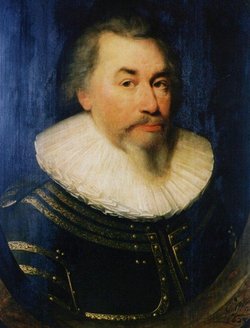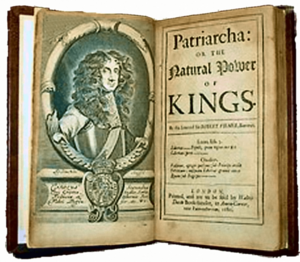Robert Filmer facts for kids
Quick facts for kids
Robert Filmer
|
|
|---|---|

Filmer c. 1650
|
|
| Born | c. 1588 East Sutton, Kent, England
|
| Died | 26 May 1653 (aged 64–65) |
| Alma mater | Trinity College, Cambridge |
| Era | 17th-century philosophy |
| Region | Western philosophy |
|
Main interests
|
Political philosophy |
|
Notable ideas
|
Divine right of kings Family as a model for the state |
Sir Robert Filmer (born around 1588 – died May 26, 1653) was an English thinker who studied politics. He strongly believed in the idea of the divine right of kings. This meant he thought kings got their power directly from God. His most famous book, Patriarcha, was published after he died in 1680. Many other writers, like John Locke, wrote books to argue against Filmer's ideas. Filmer also wrote about the ideas of other famous thinkers such as Thomas Hobbes and Aristotle.
Contents
Who Was Robert Filmer?
Robert Filmer was born in a place called East Sutton in Kent, England. He was the oldest child of Sir Edward Filmer and Elizabeth Filmer. In 1604, he went to Trinity College, Cambridge, a famous university. He later studied law but probably did not work as a lawyer.
In 1618, Robert Filmer married Anne Heton. The next year, King James I made him a knight. This meant he got the title "Sir."
What Happened During the English Civil War?
When his father died in 1629, Robert Filmer took over the family home and land. He became a local judge and helped with the county's army.
During the 1640s, England had a big fight called the English Civil War. This war was between the King's supporters (called Royalists) and the Parliament's army (called Parliamentarians). Filmer's oldest son helped the King.
In 1642, the Parliament's army attacked and robbed Filmer's home. His properties were heavily taxed to help pay for the war. Filmer was suspected of helping the King, but no strong proof was found. He even said he tried to stay out of the fight. Still, he was put in prison for some years and his lands were taken away.
Robert Filmer passed away around May 26, 1653. He was buried in the church in East Sutton. He had a wife, three sons, and one daughter who lived longer than him. His son, also named Robert, later became the first of the Filmer baronets, a special title given by the King.
Filmer's Important Books and Ideas
Robert Filmer started writing when the King and Parliament were arguing a lot. His writings show the strong beliefs of those who supported the "Divine Right of Kings."
His most complete ideas are in his book Patriarcha, or the Natural Power of Kings. He probably started writing it in the 1620s and finished it before the Civil War began in 1642. This book was published after he died. A historian named Christopher Hill said that Filmer's arguments in Patriarcha were based on stories from the Old Testament of the Bible.
What Were His Other Writings About?
Filmer published other books during his lifetime.
- Of the Blasphemie against the Holy Ghost (1647) argued against some religious ideas.
- The Freeholders Grand Inquest (1648) was about English history and government.
- Anarchy of a Limited and Mixed Monarchy (1648) attacked another writer's ideas about the King's power. Filmer believed the King's power was stronger than Parliament's.
In 1652, he published Observations concerning the Original of Government. In this book, he criticized famous political writings by Hugo Grotius, John Milton, and Thomas Hobbes. Another book, The Power of Kings, and in particular, of the King of England, was written in 1648 but published in 1680.
Filmer's Main Beliefs
Filmer's main idea was that the way a father rules his family is the perfect example for how a government should work. He believed that God gave the first man, Adam, complete power over his family. This power, he thought, was passed down through generations to kings and rulers. Because of this, Filmer believed that kings had absolute power, meaning their power was complete and came from God.
He thought that a king should rule by his own will, not by the laws or wishes of his people. He believed that kings were bound by natural law to do what was best for their kingdom. However, he also thought that no human laws could fully control a king.
How Did Filmer View English Government?
In his book Freeholders Grand Inquest (1648), Filmer said that in the English government:
- The House of Lords only gave advice to the King.
- The House of Commons only agreed to the King's rules.
- The King alone made laws, and their power came only from his will.
Filmer thought it was wrong for people to judge or remove their king. He believed that if people could do this, they would be judging themselves, which he saw as unfair.
What Did Filmer Think About Democracy?
Filmer strongly disliked democracy, where people vote for their leaders. He thought that ancient Athens, a famous democracy, was not truly fair. He claimed that Athenians only followed the wishes of the crowd, not real justice. He also believed that ancient Rome was only ruled fairly after it became an empire, not when it was a republic with more public involvement.
See also
In Spanish: Robert Filmer para niños
List of Works by Robert Filmer
- Of the Blasphemie against the Holy Ghost (1647)
- The Free-holders Grand Inquest (1648)
- The Anarchy of a Limited or Mixed Monarchy (1648)
- The Necessity of the Absolute Power of All Kings (1648)
- Observations Concerning the Originall of Government, upon Mr Hobs Leviathan, Mr Milton against Salmasius, H. Grotius De Jure Belli (1652)
- Observations Upon Aristotles Politiques concerning Forms of Government, Together with Directions for Obedience to Gouvernors in dangerous and doubtfull times (1652)
- An Advertisement to the Jury-Men of England Touching Witches (1653)
- Patriarcha (1680)
 | Frances Mary Albrier |
 | Whitney Young |
 | Muhammad Ali |


